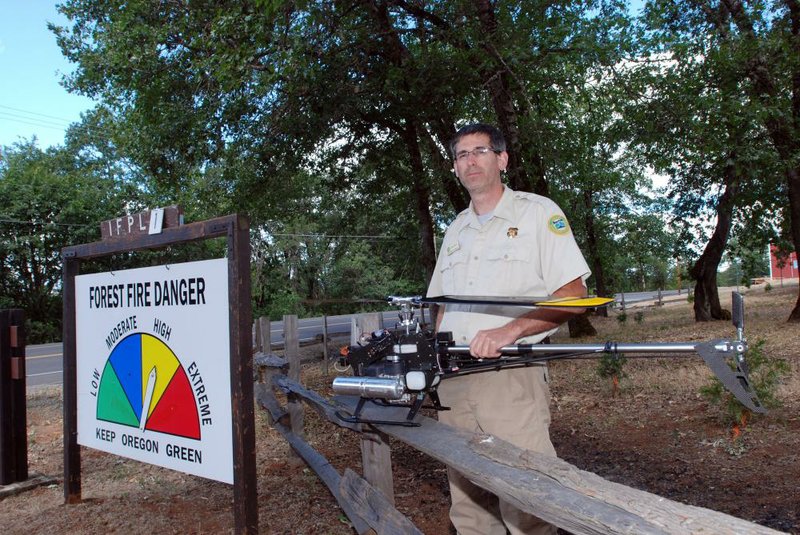As the National Park Service takes steps to prohibit the use of unmanned aerial vehicles at its parks, other agencies governing nature reserves in Arkansas have held off on establishing specific policies for the devices.
A memorandum issued last month by the Park Service banned the launching, landing or operation of unmanned aerial vehicles, most commonly known as drones, in lands or waters under the agency's jurisdiction.
"As unmanned aircraft have become more affordable and easier to operate, they have begun to appear in some park areas," Park Service Director Jonathan Jarviswrote in a memo. "Although their use remains relatively infrequent across the National Park System, this new use has the potential to cause unacceptable impacts such as harming visitors, interfering with rescue operations, causing excessive noise, impacting view sheds, and disturbing wildlife."
The ban on drones is temporary until the Park Service forms an agencywide policy, the memo said.
The new rule also follows previous bans by several individual national parks in the country after noise and nuisance complaints by visitors and an incident which "harassed" wildlife in a park, according to the news release. The devices are increasingly being used to take photographs and film videos.
"It seems to me that if the director of the Park Service felt compelled to issue the prohibition, it's because we're having problems nationwide that require that measure to be taken," said Josie Fernandez, superintendent of Hot Springs National Park. "In some areas, it's going to be a non-issue."
Nonetheless, the new policy by the Park Service is part of a larger debate concerning regulation of drones.
The Federal Aviation Administration prohibits the use of unmanned vehicles for commercial purposes, but some users say a recent court case nullifies the agency's authority over the device -- an issue that extended to Arkansas after local television stations used the aircraft to capture aerial footage of the damage left by a tornado that hit the state in April.
But the FAA does allow flying drones for recreational reasons. The agency's current rules limit unmanned aircraft for approved government or research use and by hobbyists if they keep them below 400 feet.
The FAA is updating its rules for drones, but the regulations aren't expected for another year. A new audit by the U.S. Department of Transportation said the agency has faced hurdles in integrating drones into the airspace and won't meet the 2015 deadline set by Congress, according to news reports.
"The National Park Service made us aware of its actions," said Lynn Lunsford, spokesman for the administration, in an email. "While the FAA is responsible for all of the National Airspace System, the National Park Service has the authority to say whether these aircraft are allowed to take off or land in the parks."
He said all airspace in the country, including national and state parks, is within the National Airspace System.
While the new drone regulation by the Park Service trickles down to local national reserves, there are no policies specifically for drones at state parks in Arkansas.
"At this point, we don't have a policy on it," said Greg Butts, Arkansas' parks director. "We'll be addressing that as the industry advances."
Butts, who said he is not aware of drones being a problem in the parks, said any enforcement on drone usage will fall under the agency's policies on public disturbances.
"We'll be looking at that simultaneously; it does raise several questions," he said about the National Park Service's ban.
Butts said the use of drones in parks is tricky because there needs to be a balance between providing trails and quieter places in the parks -- an environment many people search for when they visit -- and allowing the use of the area for other reasons.
"I can see if there were many people using [drones], it can certainly be troubling to park visitors who are looking to go to parks for other reasons and not having a drone overhead," he said.
While some state agencies, such as the Oregon Department of Forestry, have purchased radio-controlled aircraft to detect and monitor wildfires on public and private land, others have yet to adopt the technology.
Adriane Barnes, a spokesman for the Arkansas Forestry Commission, said the commission has no plans to purchase drones because the agency's flights need a person to be in the aircraft. The agency protects the state's forests and responds to wildfires.
But another federal agency, the U.S. Army Corps of Engineers, is considering buying unmanned aerial vehicles to monitor its facilities, which include campgrounds and other recreational facilities along the waterways and lakes it manages.
"We would have to see if it was a wise investment," said Laurie Driver, spokesman for the Corps' Little Rock district.
The Corps of Engineers is in the very early stages of considering the use of drones, she said.
"It's a fairly new technology. We're looking at it, but I don't know if we are going to jump feet first," Driver said.
SundayMonday Business on 07/07/2014

